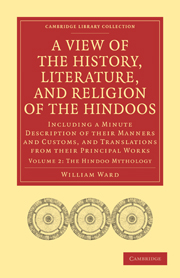 A View of the History, Literature, and Religion of the Hindoos
A View of the History, Literature, and Religion of the Hindoos Book contents
- Frontmatter
- Contents
- BOOK II OF THE TEMPLES, IMAGES, PRIESTS, AND TEMPLE WORSHIP OF THE HINDOOS
- BOOK III OF THE STATED PERIODS OF WORSHIP, AND VARIOUS DUTIES AND CEREMONIES
- BOOK V DOCTRINES OF THE HINDOO RELIGION
- BOOK VI
- BOOK VII HINDOO RELIGIOUS SECTS
- CONCLUDING REMARKS
- APPENDIX: Scripture Illustrations from Hindoo Manners and Customs
- Frontmatter
- Contents
- BOOK II OF THE TEMPLES, IMAGES, PRIESTS, AND TEMPLE WORSHIP OF THE HINDOOS
- BOOK III OF THE STATED PERIODS OF WORSHIP, AND VARIOUS DUTIES AND CEREMONIES
- BOOK V DOCTRINES OF THE HINDOO RELIGION
- BOOK VI
- BOOK VII HINDOO RELIGIOUS SECTS
- CONCLUDING REMARKS
- APPENDIX: Scripture Illustrations from Hindoo Manners and Customs
Summary
The author cannot close this work, without soliciting the attention of the reader to one or two remarks:—
It will appear, on a perusal of this volume, that the object of worship among all the Hindoos, and even among all the seceders from the orthodox opinions, is the same. They believe, that there is one God: so completely abstracted in his own essence however, that, in this state, he is emphatically ‘the Unknown,’ and is consequently neither the object of worship, of hope, nor of fear;—that he is even destitute of intelligence, and remains in a state of profound repose;—that at times this Being assumes what is called his energy;—that when united to energy, he is possessed of qualities, and creates worlds; which qualities are impressed, more or less, on every form of existence. Next God becomes individuated, and takes possession of every form of matter: it is the same God, as Krishnŭ says, ‘which is seen in the reverend bramhŭn perfected in knowledge, in the dog, and in him who eateth of the flesh of dogs.’ Amongst the regular Hindoos, the beings supposed to possess most of this energy, or in whom the presiding deity eminently dwells, are the gods, the giants, the bramhŭns, and devout ascetics: amongst the heterodox sects, ascetics are almost exclusively considered as the favoured depositaries of the divine energy.
- Type
- Chapter
- Information
- A View of the History, Literature, and Religion of the HindoosIncluding a Minute Description of their Manners and Customs, and Translations from their Principal Works, pp. 306 - 312Publisher: Cambridge University PressPrint publication year: 2010First published in: 1817


